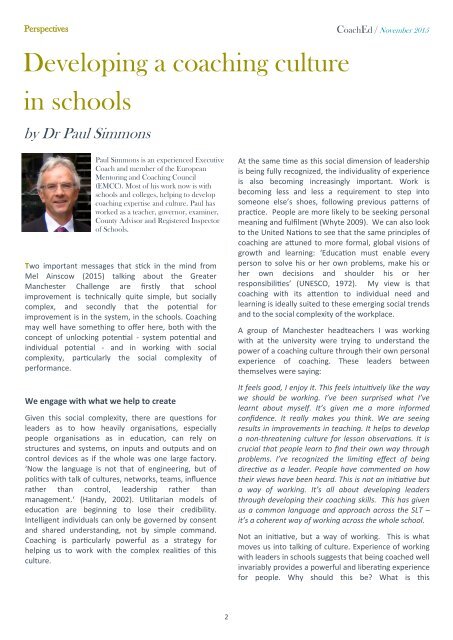The Teaching Leaders Coaching Journal
21dX4iN
21dX4iN
You also want an ePaper? Increase the reach of your titles
YUMPU automatically turns print PDFs into web optimized ePapers that Google loves.
Perspectives<br />
CoachEd / November 2015<br />
Developing a coaching culture<br />
in schools<br />
by Dr Paul Simmons<br />
Paul Simmons is an experienced Executive<br />
Coach and member of the European<br />
Mentoring and <strong>Coaching</strong> Council<br />
(EMCC). Most of his work now is with<br />
schools and colleges, helping to develop<br />
coaching expertise and culture. Paul has<br />
worked as a teacher, governor, examiner,<br />
County Advisor and Registered Inspector<br />
of Schools.<br />
Two important messages that stick in the mind from<br />
Mel Ainscow (2015) talking about the Greater<br />
Manchester Challenge are firstly that school<br />
improvement is technically quite simple, but socially<br />
complex, and secondly that the potential for<br />
improvement is in the system, in the schools. <strong>Coaching</strong><br />
may well have something to offer here, both with the<br />
concept of unlocking potential - system potential and<br />
individual potential - and in working with social<br />
complexity, particularly the social complexity of<br />
performance.<br />
We engage with what we help to create<br />
Given this social complexity, there are questions for<br />
leaders as to how heavily organisations, especially<br />
people organisations as in education, can rely on<br />
structures and systems, on inputs and outputs and on<br />
control devices as if the whole was one large factory.<br />
‘Now the language is not that of engineering, but of<br />
politics with talk of cultures, networks, teams, influence<br />
rather than control, leadership rather than<br />
management.‘ (Handy, 2002). Utilitarian models of<br />
education are beginning to lose their credibility.<br />
Intelligent individuals can only be governed by consent<br />
and shared understanding, not by simple command.<br />
<strong>Coaching</strong> is particularly powerful as a strategy for<br />
helping us to work with the complex realities of this<br />
culture.<br />
At the same time as this social dimension of leadership<br />
is being fully recognized, the individuality of experience<br />
is also becoming increasingly important. Work is<br />
becoming less and less a requirement to step into<br />
someone else’s shoes, following previous patterns of<br />
practice. People are more likely to be seeking personal<br />
meaning and fulfilment (Whyte 2009). We can also look<br />
to the United Nations to see that the same principles of<br />
coaching are attuned to more formal, global visions of<br />
growth and learning: ‘Education must enable every<br />
person to solve his or her own problems, make his or<br />
her own decisions and shoulder his or her<br />
responsibilities’ (UNESCO, 1972). My view is that<br />
coaching with its attention to individual need and<br />
learning is ideally suited to these emerging social trends<br />
and to the social complexity of the workplace.<br />
A group of Manchester headteachers I was working<br />
with at the university were trying to understand the<br />
power of a coaching culture through their own personal<br />
experience of coaching. <strong>The</strong>se leaders between<br />
themselves were saying:<br />
It feels good, I enjoy it. This feels intuitively like the way<br />
we should be working. I’ve been surprised what I’ve<br />
learnt about myself. It’s given me a more informed<br />
confidence. It really makes you think. We are seeing<br />
results in improvements in teaching. It helps to develop<br />
a non-threatening culture for lesson observations. It is<br />
crucial that people learn to find their own way through<br />
problems. I’ve recognized the limiting effect of being<br />
directive as a leader. People have commented on how<br />
their views have been heard. This is not an initiative but<br />
a way of working. It’s all about developing leaders<br />
through developing their coaching skills. This has given<br />
us a common language and approach across the SLT –<br />
it’s a coherent way of working across the whole school.<br />
Not an initiative, but a way of working. This is what<br />
moves us into talking of culture. Experience of working<br />
with leaders in schools suggests that being coached well<br />
invariably provides a powerful and liberating experience<br />
for people. Why should this be? What is this<br />
2


